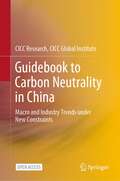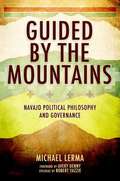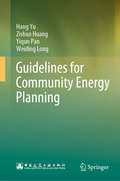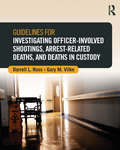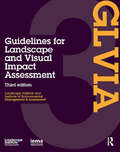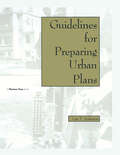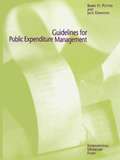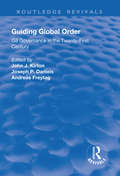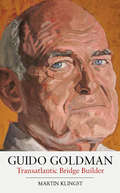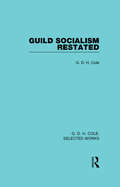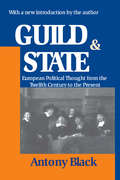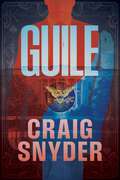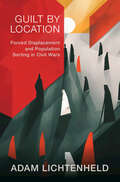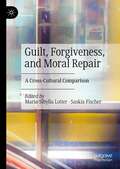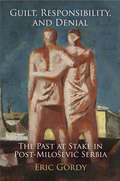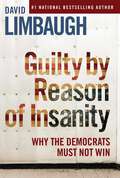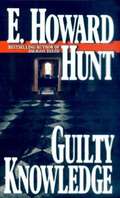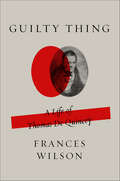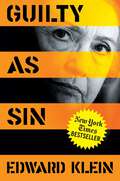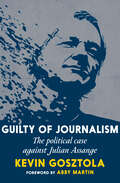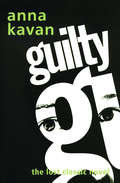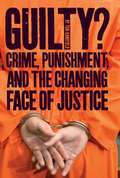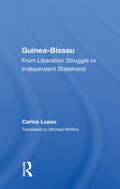- Table View
- List View
Guidebook to Carbon Neutrality in China: Macro and Industry Trends under New Constraints
by CICC Research, CICC Global InstituteThis Open Access publication focuses on China’s goal of achieving peak carbon emissions in 2030 and carbon neutrality by 2060. The book is the first to systematically build a framework combining a top-down and bottom-up analysis of this acute topic.What does carbon neutrality mean for economics in China? Might it imply stagflation or is it an opportunity to maximize the potential of green manufacturing?The book offers a comprehensive analysis of how the pursuit of carbon neutrality may influence the development of China's economy, and the country's biggest industries, while foreseeing the likely changes in people's lifestyles.In total, the book constructs a comprehensive path for China's carbon neutrality drive from the perspective of the green premium. This effort lays the foundation for a discussion of the country's emissions reduction plan.The book goes further, calculating the investment required for different sectors to achieve carbon neutrality, and illustrating the roles of carbon pricing and green finance in this undertaking.The book’s information comes from a network of primary sources, including experts in the field and noted academics, to depict potential low-carbon roadmaps and green transitions in major industries.Emphasized is green development in sectors that will be critical to civilization, including in technology, energy, manufacturing, transportation, and urban planning, which are backed by in-depth discussions and analyses.Accessible and academically rigorous, the work is anchored in the economics of carbon neutrality, extends to potential policy implications and identifies investment opportunities.This valuable reference will attract readers interested in public policy, economics, finance, and investors who seek to better understand China's prospects in the low-carbon economy of the near future.
Guided By The Mountains: Navajo Political Philosophy And Governance
by Michael Lerma Avery Denny Robert YazzieWhat do traditional Indigenous institutions of governance offer to our understanding of the contemporary challenges faced by the Navajo Nation today and tomorrow? Guided by the Mountains looks at the tensions between Indigenous political philosophy and the challenges faced by Indigenous nations in building political institutions that address contemporary problems and enact "good governance." Specifically, it looks at Navajo, or Diné, political thought, focusing on traditional Diné institutions that offer "a new (old) understanding of contemporary governance challenges" facing the Navajo Nation. <p><p> Arguing not only for the existence but also the persistence of traditional Navajo political thought and policy, Guided by the Mountains asserts that "traditional" Indigenous philosophy provides a model for creating effective governance institutions that address current issues faced by Indigenous nations. Incorporating both visual interpretations and narrative accounts of traditional and contemporary Diné institutions of government from Diné philosophers, the book is the first to represent Indigenous philosophy as the foundation behind traditional and contemporary governance. It also explains how Diné governance institutions operated during Pre-Contact and Post-Contact times. This path-breaking book stands as the first-time normative account of Diné philosophy.
Guidelines for Community Energy Planning
by Hang Yu Zishuo Huang Yiqun Pan Weiding LongThis book systematically introduces readers to the operator method, which can be used in different stages of urban planning. Energy planning should ideally be accompanied by urban planning, ranging from comprehensive planning and detailed planning, to the design of individual construction projects. This book discusses a range of methods and models for defining energy planning objectives; analyzing and predicting energy demand; assessing available energy resources; optimizing integrated energy systems; analyzing the cost-effectiveness of proposals; implementation management; and post-assessment. Part one focuses on energy planning in different urban planning stages, while part two provides detailed discussions of key issues related to energy planning.
Guidelines for Fiscal Adjustment
by International Monetary FundA report from the International Monetary Fund.
Guidelines for Investigating Officer-Involved Shootings, Arrest-Related Deaths, and Deaths in Custody (Routledge Series on Practical and Evidence-Based Policing)
by Darrell L. Ross Gary M. VilkeAs unrest over officer-involved shootings and deaths in custody takes center stage in conversations about policing and the criminal justice system, Guidelines for Investigating Officer-Involved Shootings, Arrest-Related Deaths, and Deaths in Custody addresses critical investigation components from an expert witness perspective, providing the insights necessary to ensure a complete investigation. Investigating a custodial death or an officer involved in a shooting presents unique and complex issues: estate, community, judicial, agency, involved officer, and public policy interests are all at stake. These types of deaths present various emerging medical, psychological, legal and liability, technical, and investigatory issues that must be addressed through a comprehensive investigation. This book is ideal for students in criminal investigation, death investigation, crime scene investigation, and special topic courses in custodial deaths and officer-involved shootings, as well as for death investigators, law enforcement officers, police administrators, and attorneys.
Guidelines for Landscape and Visual Impact Assessment
by Landscape Institute I.E.M.A.Landscape and Visual Impact Assessment (LVIA) can be key to planning decisions by identifying the effects of new developments on views and on the landscape itself. This fully revised edition of the industry standard work on LVIA presents an authoritative statement of the principles of assessment. Offering detailed advice on the process of assessing the landscape and visual effects of developments and their significance, it also includes a new expanded chapter on cumulative effects and updated guidance on presentation. Written by professionals for professionals, the third edition of this widely respected text provides an essential tool for landscape practitioners, developers, legal advisors and decision-makers.
Guidelines for Preparing Urban Plans
by Larz AndersonWhile many authors have written about what urban plans should contain and how they should be used, this comprehensive book leads you step by step through the entire plan preparation process. Citing examples from across the country, Larz Anderson shows how to prepare, review, adopt, and implement urban plans. He explains how to identify public needs and desires, analyze existing problems and opportunities, and augment long-range general plans with short-range district and function plans. Anderson presents these guidelines as tasks. For each task, he explains the rationale behind it, recommends a procedure for completing it, and identifies the expected results. Throughout, Anderson encourages improvisation — he urges planners to adapt the guidelines to meet local needs. Excerpts from recently adopted general plans illustrate Anderson's points and provide examples of variations even within his recommendations. A related glossary gives comprehensive definitions to words that, though not technical, have meanings specific to the urban plan.
Guidelines for Public Expenditure Management
by Jack Diamond Barry H. PotterFor many years, the IMF's Public Expenditure Management Division has answered many questions raised by fiscal economists on missions. Based on this experience, these guidelines provide a general overview of the principles and practices observed in three key aspects of public expenditure management: budget preparation, budget execution, and cash planning. For each aspect the guidelines look at the differing practices in four groups of countries: the francophone system, the Commonwealth systems, Latin America, and those in the transition economies.
Guides to the Coinage of the Ancient World: The Hellenistic World
by Peter ThonemannCoinage is one of our key sources for the rich and fascinating history of the Hellenistic world (323–31 BC). This book provides students of the period with an up-to-date introduction to Hellenistic gold, silver and bronze coins in their cultural and economic contexts. It also offers new perspectives on four major themes in contemporary Hellenistic history: globalisation, identity, political economy and ideology. With more than 250 illustrations, and written in a lucid and accessible style, this book sheds new light on the diverse and multicultural societies of the Hellenistic world, from Alexander to Augustus. The author assumes no prior knowledge of Hellenistic history, and all Greek and Latin texts are translated throughout.
Guiding Global Order: G8 Governance in the Twenty-First Century (Routledge Revivals)
by Andreas Freytag Joseph P. Daniels John J. KirtonThis title was first published in 2001. John Kirton, Joseph Daniels and Andreas Freytag present an indispensable and authoritative collection of papers which examine both the professional economic merits and the underlying politics, of the hotly contested competing initiatives for strengthening the international financial system. Containing the first treatment of China’s relationship with the G7/G8 and comprehensive analysis of the new G20 forum, this volume in the G8 and Global Governance series also looks at the possibilities for the G8 system. It places the work of the G7 within a broader context of global governance and the new challenges facing the international community in the new century. A balanced selection of distinguished experts from the G7 countries and from emerging markets outside, provide an essential addition to the bookshelves of academics, government officials and business and media communities interested in keeping abreast of the ongoing and rapidly expanding work of the G7/G8 system.
Guido Goldman: Transatlantic Bridge Builder
by Martin KlingstThe son of Nahum Goldmann, who was the founder of the World Jewish Congress, Guido Goldman was one of the most distinguished protagonists of the reintegration of Germany into the international community after the defeat of Nazism in 1945. Later he helped establish the German Marshall Fund and created Harvard University’s Center for European Studies as one of the pre-eminent research institutes and meeting places in the world for scholars, graduate students, prominent politicians, and artists. His large network of friends and interlocutors included Willy Brandt and Helmut Kohl, Henry Kissinger and Ronald Reagan, Harry Belafonte and Marlene Dietrich. His generous philanthropy extended to the preservation of non-Western cultures threatened by extinction, such as the IKAT project through which he revived the unique ancient textile arts of Central Asia. All this comes alive in Martin Klingst’s careful reconstruction of Goldman's life.
Guild Socialism Restated (Routledge Library Editions)
by G. D. H. ColeGuild Socialism Restated is G. D. H. Cole’s fullest and most systematic account of his vision of industrial and political reorganization. The introductory chapters of the volume develop the theme of democratic citizenship in relation to industrial society. Cole contends that neither capitalism nor state socialism can adequately meet the fundamental requirements of democracy because neither provides institutions through which active citizenship can be achieved. He insists that the latter can only be realized in the realm of industrial relations. The central chapters of the book develop a view of socialist organization in which citizenship is a vital ingredient in every arena – from that of the workplace to national policymaking.
Guild and State: European Political Thought from the Twelfth Century to the Present
by Antony BlackGuild and State examines the values of social solidarity and fraternity that emerged from medieval guilds and city-communes, and the effect of traditional corporate organization of labor on socioeconomic attitudes and theories of the state. What ordinary guildsmen and townsmen thought about these issues can be gleaned from chronicles, charters, and reported slogans. But in tracing attitudes toward the guilds of early Germanic times to today's equivalent-trade unions-a distinction must be made between popular "ethos" and learned "philosophy." In Europe, from the twelfth to the seventeenth centuries, the corporate organization of labor and of town-market communities developed side-by-side with the ideals of personal liberty, market freedom, and legal equality. Self-governing labor organizations and civil freedom developed together as coherent practices. The values of mutual aid and craft honor on the one hand, and of personal freedom and legal equality on the other, formed the moral infrastructure of our civilization. Alternate ideals balanced, harmonized, and even cross-fertilized one another-as in the principle of freedom of association. Contrary to preconceptions, however, corporate values were seldom expressed philosophically in the Middle Ages. Political theory and the world of learning from the start emphasized liberal values. It was only after the Reformation that guild and communal values found expression in political theory. Even then only a few philosophers acknowledged that solidarity and exchange-the poles around which the values of guild and civil society, respectively, rotate-are not opposites but complementary, and attempted to weave these together into a texture as tough and complex as that of urban society itself. By showing that the ideals of social solidarity and workers' rights have often been intertwined with liberty and equality rather than in opposition to them, this book provides an unexpected explanation and rationale for the "Third Way." The Enlightenment and industrialization led to an apotheosis of liberal values. Guilds disappeared and were only in part replaced by labor unions; the values of market exchange have since been in the ascendant-though Hegel, Durkheim, and more recently, advocates of liberal corporatism maintain the possibility of a symbiosis between corporate and liberal values. In Guild and State there emerges an alternative history of political thought, which will be fascinating to the general as well as the specialist reader.
Guile
by Craig Snyder&“If you like political intrigue, this is the book for you.&” – Marjorie Margolies, former Democratic Congresswoman &“This book gives you a sense of how politics happens in real life because Craig Snyder has lived it.&” – Andrew Yang, former Democratic candidate for President of the United States As November approaches, two near opposites clash for the nation's highest office. It's Ven Hess, firebrand populist breaking all the old rules, known as "The Hessian" for his intimidating tactics on the pitcher's mound, versus Democrat Alec Maynard, an African American Admiral with his own flaws but who offers the nation at least some hope of normalcy. Pete Vankov, a political operative known as the "Dark Angel" because of his reputation for winning at all costs, spearheads the Hess campaign. Meanwhile, an estranged colleague, David Gruber, together with The Globe's political reporter, Jane Berglund, devises a plan to thwart Vankov's march towards a dirty and dangerous victory. Who wins? With Guile, veteran political strategist Craig Snyder has written a thriller exposing the dark underbelly of American politics, a novel rich in suspense and intrigue that will have readers turning its pages quickly in rueful anticipation of the next election. &“Snyder has been a national political insider and highest level operative for three decades and it shows in the authenticity and details on every page of this gripping &‘House of Cards&’ style novel.&” – James Greenwood, former GOP Congressman &“Snyder outlines how ethically compromised these relationships can be. How tough... how impossible... when they find themselves flying too close to the flame. There is sizzle and scandal. They get so far, they can&’t turn back and typically they&’re convinced that they must win at any cost... that the ends justify the means. It&’s ripped from the headlines, you will recognize the players. Sometimes it becomes a battle between the bad and the worse. Snyder provides a surprising and rather uplifting ending. If you like political intrigue, this is the book for you.&” – Marjorie Margolies, former Democratic Congresswoman
Guilt by Location: Forced Displacement and Population Sorting in Civil Wars
by Adam LichtenheldPopulation displacement is a devastating feature of contemporary conflict with far-reaching political and humanitarian consequences. This book demonstrates the extent to which displacement is a deliberate strategy of war, not just a consequence of it. Moving beyond instances of ethnic cleansing, Adam Lichtenheld draws on field research in Uganda and Syria; case studies from Burundi, Indonesia, and Vietnam; and an original dataset of strategic displacement in 166 civil wars to show that armed groups often uproot civilians to sort the targeted population, not to get rid of it. When lacking information about opponents' identities and civilians' loyalties, combatants use human mobility to infer wartime affiliations through 'guilt by location'. Different displacement strategies occur in different types of civil wars, with some relying on spatial profiling, rather than ethnic profiling. As displacement reaches record highs, Lichtenheld's findings have important implications for the study of forced migration and policy responses to it.
Guilt, Forgiveness, and Moral Repair: A Cross-Cultural Comparison
by Maria-Sibylla Lotter Saskia FischerIn current debates about coming to terms with individual and collective wrongdoing, the concept of forgiveness has played an important but controversial role. For a long time, the idea was widespread that a forgiving attitude — overcoming feelings of resentment and the desire for revenge — was always virtuous. Recently, however, this idea has been questioned. The contributors to this volume do not take sides for or against forgiveness but rather examine its meaning and function against the backdrop of a more complex understanding of moral repair in a variety of social, circumstantial, and cultural contexts. The book aims to gain a differentiated understanding of the European traditions regarding forgiveness, revenge, and moral repair that have shaped our moral intuitions today whilst also examining examples from other cultural contexts (Asia and Africa, in particular) to explore how different cultural traditions deal with the need for moral repair after wrongdoing.
Guilt, Responsibility, and Denial: The Past at Stake in Post-Milosevic Serbia (Pennsylvania Studies in Human Rights)
by Eric GordyWhen the regime led by Slobodan Milošević came to an end in October 2000, expectations for social transformation in Serbia and the rest of the Balkans were high. The international community declared that an era of human rights had begun, while domestic actors hoped that the conditions that had made a violent dictatorship possible could be eliminated. More than a decade after the International Criminal Tribunal for the Former Yugoslavia initiated the process of bringing violators of international humanitarian law to justice, significant legal precedents and facts have been established, yet considerable gaps in the historical record, along with denial and disagreements, continue to exist in the public memory of the Yugoslav wars.Guilt, Responsibility, and Denial sets out to trace the political, social, and moral challenges that Serbia faced from 2000 onward, offering an empirically rich and theoretically broad account of what was demanded of the country's citizens as well its political leadership—and how these challenges were alternately confronted and ignored. Eric Gordy makes extensive use of Serbian media to capture the internal debate surrounding the legacy of the country's war crimes, providing one of the first studies to examine international institutional efforts to build a set of public memories alongside domestic Serbian political reaction. By combining news accounts, courtroom transcripts, online discussions, and his own field research, Gordy explores how the conflicts and crimes that were committed under Milošević came to be understood by the people of Serbia and, more broadly, how projects of transitional justice affect the ways society faces issues of guilt and responsibility. In charting the legal, political, and cultural forces that shape public memory, Guilt, Responsibility, and Denial promises to become a standard resource for studies of Serbia as well as the workings of international and domestic justice in dealing with the aftermath of war crimes.
Guilty By Reason of Insanity: Why The Democrats Must Not Win
by David Limbaugh"Today&’s Democrats are pushing policies that are simply insane, and David Limbaugh proves it in his terriffic, and tremendously important, new book, Guilty by Reason of Insanity." — MARK LEVIN "Few pundits can match David Limbaugh for research, depth of knowledge, and political insight, and in this book, perhaps his best political book, he shows how the Democrat Party has completely lost its mind." — SEAN HANNITY <P><P>The left has truly lost its mind. The party out of power used to be &“the loyal opposition.&” No longer. Now it&’s &“the Resistance.&” The left, abandoning any pretense of fairness and decency, has declared political war on President Trump. Waged by a stunningly broad array of militants—the Democratic Party, countless left-wing interest groups, radical academics, the liberal mainstream media, Antifa shock troops, Hollywood, and the tech oligarchs—this political war is aimed not only at conservative ideas but also at Trump supporters, even teenagers wearing MAGA hats. <P><P>In his shocking new book, Guilty by Reason of Insanity, national #1 bestselling author David Limbaugh explains how the left lost its mind—and the threat it now poses to us all. No book you read this year could be more important. <P><P><b>A New York Times Bestseller</b>
Guilty Knowledge
by E. Howard HuntIn this action-packed tale of Washington intrigue, Senator Alison Bowman has a shot at becoming the first female president of the United States--until a lurid video tape shows up. When the blackmailer is killed, Alison becomes the suspect. And the Washington lawyer who comes to her aid becomes a pawn in a deadly game.
Guilty Thing: A Life of Thomas De Quincey
by Frances WilsonNational Book Critics Circle Award, Biographers International Organization Plutarch Award and Los Angeles Times Book Prize FinalistNew York Times Book Review, Times Literary Supplement and The Guardian Best Books of 2016Thomas De Quincey was an obsessive. He was obsessed with Wordsworth and Coleridge, whose Lyrical Ballads provided the script to his life, and by the idea of sudden death. Running away from school to pursue the two poets, De Quincey insinuated himself into their world. Basing his sensibility on Wordsworth’s and his character on Coleridge’s, he forged a triangle of unusual psychological complexity.Aged twenty-four, De Quincey replaced Wordsworth as the tenant of Dove Cottage, the poet’s former residence in Grasmere. In this idyllic spot he followed the reports of the notorious Ratcliffe Highway murders of 1811, when two families, including a baby, were butchered in their own homes. In his opium-soaked imagination the murderer became a poet while the poet became a murderer. Embedded in On Murder as One of the Fine Arts, De Quincey’s brilliant series of essays, Frances Wilson finds the startling story of his relationships with Wordsworth and Coleridge.Opium was the making of De Quincey, allowing him to dissolve self-conflict, eliminate self-recrimination, and divest himself of guilt. Opium also allowed him to write, and under the pseudonym “The Opium-Eater” De Quincey emerged as the strangest and most original journalist of his age. His influence has been considerable. Poe became his double; Dostoevsky went into exile with Confessions of an English Opium-Eater in his pocket; and Charles Dickens, Oscar Wilde, George Orwell, Alfred Hitchcock, and Vladimir Nabokov were all De Quincey devotees. There have been other biographies of Thomas De Quincey, but Guilty Thing is the first to be animated by the spirit of De Quincey himself. Following the growth of his obsessions from seed to full flowering and tracing the ways they intertwined, Frances Wilson finds the master key to De Quincey’s vast Piranesian mind. Unraveling a tale of hero worship and revenge, Guilty Thing brings the last of the Romantics roaring back to life and firmly establishes Wilson as one of our foremost contemporary biographers.
Guilty as Sin: Uncovering New Evidence of Corruption and How Hillary Clinton and the Democrats Derailed the FBI Investigation
by Edward KleinA New York Times Bestseller!When FBI Director James Comey announced in July that Hillary Clinton would not be indicted for mishandling classified information, America was stunned. Had the scandal-happy Clintons escaped justice once again? Not so fast, says investigative reporter and bestselling author Ed Klein. There is far more behind Comey's shocking press conference than meets the eye -- and a minefield of email evidence between Hillary and the White House.In his astonishing new book, Klein uncovers the real story behind Hillary's email scandals and the dirty political games that have kept her one step ahead of the law - for now. Klein reveals what the FBI's team of 150+ investigators really found on Clinton's server. How Comey originally threatened to resign over White House attempts to intervene in the investigation, and his secret plan to go around the Justice Department if needed. How an unprecedented Congressional investigation during an election year is uncovering new shocking evidence of corruption on a level some would call treason. And what Bill and Hillary still have left in their bag of tricks in their desperate quest to get back into the Oval Office.
Guilty of Journalism: The Political Case against Julian Assange
by Kevin GosztolaFrom an acclaimed independent journalist, this carefully-documented analysis of the government&’s case against Julian Assange and its implications for press freedom acts as a crucial, compelling guidebook to Assange&’s upcoming trial.The legal action against Julian Assange is poised to culminate in a trial in the United States in 2023, and this book will help the public understand the proceedings. The establishment media's coverage of WikiLeaks founder Julian Assange's extradition case has focused on his deteriorating health and what CBS News called his &“secret family,&” but most of this coverage failed to detail the complex issues at stake against Assange. Guilty of Journalism outlines how WikiLeaks exposed the reality of American wars, the United States government&’s unprecedented indictment against Assange as a publisher, and the media&’s role in persuading the public to &“shoot the messenger.&”This new book by Kevin Gosztola, who has spent the last decade covering Assange, WikiLeaks, and the wider war on whistleblowers, tells the full story based on testimony from dozens of witnesses. It examines abuses of power by the CIA and the FBI, including a spying operation that targeted Assange&’s family, lawyers, and doctors. Guilty of Journalism offers a balanced and comprehensive perspective on all the events leading up to what press freedom advocates have called the trial of the century.Guilty of Journalism is a joint production of The Censored Press and Seven Stories Press.
Guilty: The Lost Classic Novel
by Anna KavanSet in an unspecified but eerily familiar time and landscape, this is the story of Mark, a protagonist who struggles against the machinations of a hostile society and bureaucracy. Suffering at first from the persecution of his father as a conscientious objector, his life quickly comes under the control of the Machiavellian Mr. Spector, an influential government minister who arranges Mark's education, later employment, and even accommodation. It is when Mark tries to break free from Spector's influence that his life begins to unravel.
Guilty?
by Teri Kanefield"An extraordinary book . . . that could well be mind-blowing to the thoughtful young reader who is ready to move beyond the black-and-white notion that a particular act is wrong simply because it is illegal." --Richie Partington When does strategy become cheating? Can good luck be theft? Is killing always a crime? Real-world cases show there are often no clear-cut answers in this fascinating look at the ever-evolving world of law and order, and crime and punishment. When some people kill, they are jailed or even executed. When others do, they are celebrated as heroes. Though this example is extreme, it's just one of many that author and lawyer Teri Kanefield explores in depth. From an examination of what constitutes a crime, why and how we punish people who commit crimes, how the government determines these rules, to how citizens have reacted when they feel laws aren't fair, this book will challenge young readers' thinking about law and order, crime and punishment, while giving them specific legal cases to ponder along the way. For ages 12 and up, this examination of the legal system will also include historical photography to help bring each legal case to life.
Guinea Bissau: From Liberation Struggle To Independent Statehood
by Carlos LopesThis book addresses whether Guinea-Bissau is a nation or a nation in formation; what the political and ideological foundations of the national liberation movement are; and how one should characterize the historical transition from a national liberation movement to a state.
